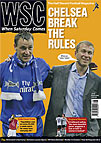 What defines a career, money or medals?
What defines a career, money or medals?
If Rio Ferdinand succeeds in getting his Manchester United salary increased to £120,000 a week, he will receive in a month what someone on the average wage would take 19 years to earn. In recent newspaper reports on his contract negotiations, Rio was depicted wearing a Che Guevara baseball cap, so he may have plans to redistribute his bloated income in a manner befitting someone who identifies with a Marxist revolutionary. But it is none the less fair to assume that he will receive advice to the contrary and that his wages will continue to be spent on fast cars, holidays in exclusive resorts and helping Jody Morris to release fire extinguishers in hotel corridors.
To Rio’s agent, his increased salary, double that of his next-best-paid team-mate Roy Keane, will be simply what he is worth as “the best central defender in the world”. Allowing for hyperbole, that makes a sort of sense: a club’s most important player would expect his wages to reflect his value to the team and, of course, labour markets are not fair – otherwise football clubs would have no justification for paying players 1,000 times the amount received by those who do more socially valuable jobs.
But this summer’s transfer merry-go-round has been a more depressing spectacle than ever before, both for demonstrating footballers’ inflated sense of their own worth and the way in which money has come to dominate their career decisions. Nowadays it is common to hear pundits such as Alan Hansen suggesting that “at the end of your career you want to look back at what you won, not study your bank balance”. This piece of wisdom has been repeated so often over the past decade that it has come to be accepted as an ancient and immutable truth. Steven Gerrard says it, Craig Bellamy says it, no doubt Frank Arnesen is muttering it to himself even as you read this – it’s medals that count. But is it? Tom Finney, Stanley Matthews and Wilf Mannion could muster just a single FA Cup winner’s gong between them. Is anyone seriously suggesting that history will regard the trio as lesser players than, say, Nigel Winterburn?
Even when the maximum wage, along with the retain-and-transfer contract system, was abolished, players were still reluctant to move in search of silverware. Johnny Haynes pulled in the highest wage in Britain and was happy to stay, trophyless, at Craven Cottage as a result. On the other hand, Steve Bull was a member of the England squad at the 1990 World Cup that is said to have been the springboard for the remodelling of football, yet all but one of his nearly 500 League appearances were made outside the top division despite the Wolves striker receiving numerous offers from higher placed clubs.
Luis Figo has plenty of medals, but also finds himself strangely unwanted (even by Bolton Wanderers) due to his insistence on being paid at least £90,000 a week. Figo, it seems, doesn’t care particularly who, if anyone, he plays for next season. The incredible financial rewards of the modern game have created a few such tetchy, hyper-rich, vagrant types in the last few years. Rivaldo flounced in and out of a few European cities finally before settling on Panathinaikos. And before long David Beckham could be the next unaffordable megastar, likely to be shepherded into early Californian retirement by his own price tag and a mutual lack of interest between player and an increasingly sated public.
The great desire for “medals” only really kicked in when the effects of the Premiership seriously took hold and cashflow became the paramount factor in determining on-field success. When English – and to an extent European – football was being dominated by relatively impecunious sides such as Brian Clough’s Forest, Bob Paisley’s Liverpool and Howard Kendall’s Everton, there was altogether less clamour to join them than there is now to rush off to Stamford Bridge or Old Trafford.
Cash-strapped Arsenal, meanwhile, struggle not only to attract players but even to hang on to the ones they have, less than 12 months after they broke all modern records by going through an entire top-flight season unbeaten and then won the FA Cup this May. Dennis Bergkamp has announced that he might just retire if he is offered only a one-year contract, while Liverpool’s Champions League triumph may not be enough to persuade Steven Gerrard to stay at Anfield. Medals, then, but only at the right price.
From WSC 222 August 2005. What was happening this month